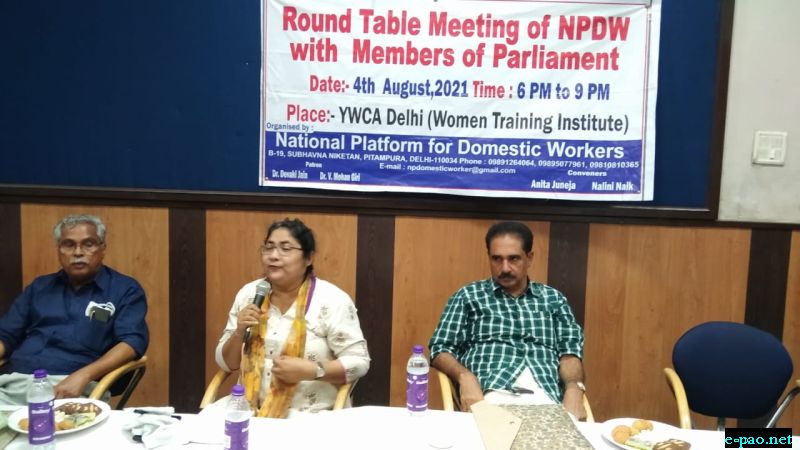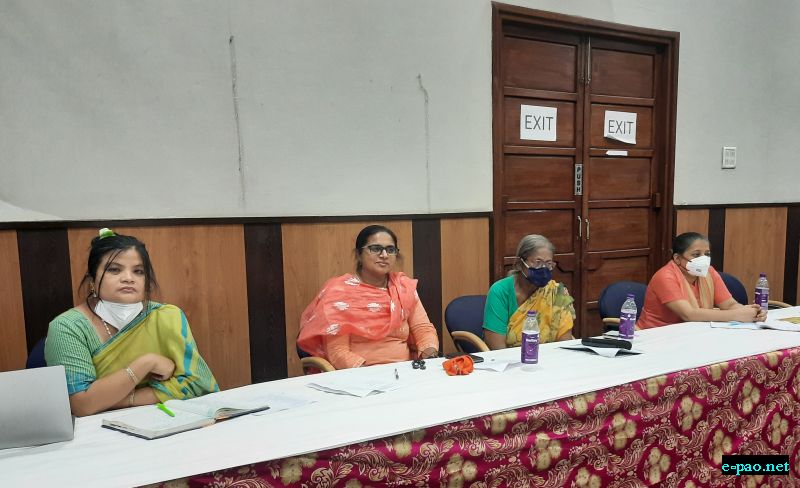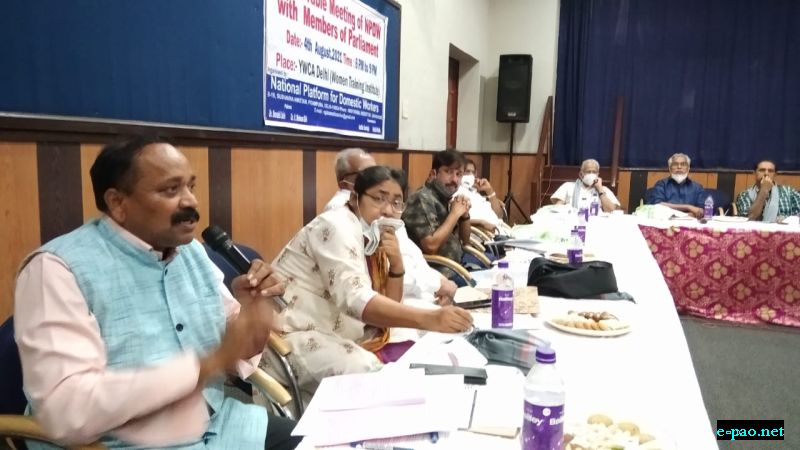
Discussion on issues of domestic workers
Delhi, August 04, 2021

Dharna and Roundtable Discussion
Organised by
National Platform of Domestic Workers.
Date: August 4th, 2021
Venue: YWCA, Ashoka Road, Near Bangla Sahib Gurudwara, Delhi
National Platform for Domestic Workers organized a token Dharna at Jaantar Mantar Road demanding a comprehensive legislation, Social Security for the domestic workers. Different NPDW constituents from Karnataka, Telengana, Tamil Nadu, Maharshtra, Kerala, Haryana and Delhi etc participated raising the slogan for fulfilling its demands. Domestic Workers from different areas raised their issues to be heard by the govt.
We all know the GOI is signatory to the adoption of ILO Convention 189 – Decent Work for Domestic Workers. Nevertheless, the GOI has paid no heed to the recognition of domestic workers as workers and their rights in the workplace. Hence since 2014 various unions of domestic workers came together as the National Platform for Domestic Workers to urge the government to ratify C 189 and put comprehensive legislation in place for domestic workers.
The Periodic Labour Force Survey (2017-18) estimates that there are 5.255 million domestic workers in the country. Of these surely 80% are poor and vulnerable women.

The recently adopted Labour Codes, also do not apply to the domestic workers on the following grounds:
1. The definition of ‘establishment’ in the Codes does not mention the home as a workplace. Private homes are the workplaces of domestic workers where they should get their rights, but this is not recognized. Hence the Codes, as they are, prohibit the domestic workers from legally demanding fair working conditions.
2. Minimum wages: 12 states in India do provide for minimum wages for domestic workers but the calculation of these wages is far below what domestic workers are earning these days. Moreover, domestic workers are considered unskilled on the whole although a large number of them are cooks or look after children, the sick and the aged all of which are jobs that require specific skills.
Now with the job schedules being dropped with the Labour Codes, all informal workers are treated as unskilled workers and hence domestic workers too do not get recognized for their skills although they are much in demand. The criteria for fixing minimum wages and also categorizing the skills should change considering the increasing informality situation and the recognition of work in the informal sector. The COVID situation has exposed the vulnerabilities of domestic workers, the majority of whom have faced job loss and have received no emergency relief or income compensation.
3.The Social Security Code provides for the creation of Welfare Boards to meet the social security needs of informal workers. It is not clear whether the boards created as per the Unorganised Sector Social Security Act 2008 continue in operation or not. In several states, domestic workers are not registered in these Boards and if they are, only a certain number are registered. In these Boards, workers are eligible to welfare schemes, several of them like pensions and insurances are contributory.
Since domestic workers have employers, employers are not liable to make any contributions for the welfare of domestic workers even when workers maybe working for them for years on end. This is blatant exploitation. A system has to be developed for the inclusion of employers also in the social security assistance for domestic workers. Possibilities of sharing some amount of house tax or similar taxes should be explored for the support also.
4. The existing Labour Code on Occupational Health and Safety, specifically excludes the recognition of domestic workers for such rights. There are no grounds provided for this exclusion and it is a known fact that several accidents and even tragic deaths of domestic workers do occur on a regular basis in the country. Sexual harassment also happens in these homes which is generally not even exposed.
5. It is also a known fact that there is a good percentage of domestic workers who live in with the employers. A good majority of these workers are migrants who are supplied by agents/contractors. There is no provision in any law to protect these workers from the exploits of the agents who make huge amounts of money in labour supply as there is also no regulation of the agents.
The majority of domestic workers are women and a large number of them are single mothers and the only earning members of their families. Since this sector of workers is so large and so important in the area of social reproduction, the NPDW demands a separate Comprehensive legislation for the protection of rights and social security of these workers. Such a legislation, like that of the Construction workers, can provide for registration of and contribution by the employers towards the social security. A percentage of the house tax can also be provided to the Social Security Board of the domestic workers.
Hence, we request the MPs to raise this issue in parliament and pursue the demand for a Comprehensive Legislation for domestic workers that is developed by the Ministry of Labour and passed through due parliamentary process.

In the Roundtable Discussion organized by NPDW at YWCA 12 MPs from Lok Sabha and Rajya Sabha from different states of the country from Kerala, West Bengal, Maharashtra, Telegana.
Raising the issue that the recently, passed Labour Codes has somewhat missed certain pertinent issues for domestic workers as cited above. The MPs present in the discussion understanding the underlining issues of the domestic workers acknowledge that the matter needs to be discussed in the Parliament.
MP from Kerala Shri Ariff A.M. expressed that though parliament has been disrupted in this Monsoon session and Bills are passed without discussion said “We are for an enactment in the Parliament for the Domestic Workers”.
Another MP from Kerala Shri Shamugam said, “ Though govt is not ready to hear the words of the Trade Union, have to find a way for the unorganized sector workers including domestic workers to improve the service conditions, ESI should be for all the unorganized workers. MP Elamavam Kareem said in the discussion “ To assure for a legislation, domestic workers issues need to be discussed seriously in the Parliament and members should jointly raise this issue in the Parliament”.